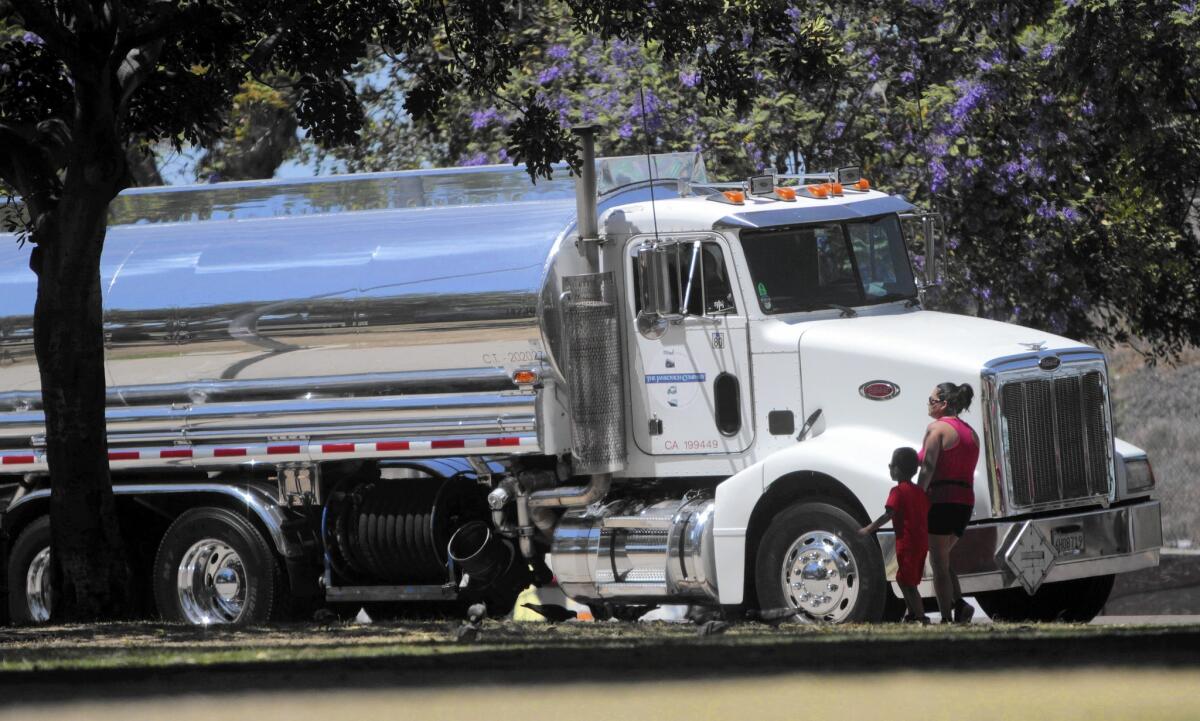Capitol Journal: Pope Francis and Brown part ways on cap and trade

in sacramento — The pope and California’s governor don’t agree on everything about climate change. Global warming’s threat to the planet? Yes. Selling permits to pollute? Hardly.
Peddling pollution permits has a euphemism. It’s politely called cap and trade. And it raises a ton of money for state government, including Gov. Jerry Brown’s struggling bullet train.
Here’s how cap and trade works:
The state — specifically the California Air Resources Board — sets industry-wide caps on greenhouse gas emissions. Corporations can buy emission “allowances” from the state or on the open market from companies that aren’t polluting all they’re entitled to.
The theory is that when it starts costing companies too much to emit harmful gas, they’ll emit less. It may be working slightly. The air board recently reported emissions fell 0.3% in 2013, the first year of cap and trade and the latest year that data are available. Meanwhile, the California economy grew 2%.
“California is showing the world how to throw off the shackles of fossil fuel dependency,” air board Chairwoman Mary Nichols said. “No longer must economic growth result in smokestacks and pollution.”
OK, but still we’re allowing companies to pollute through smokestacks if they pay off the state.
That’s the sort of thing Pope Francis strongly objected to in his recent encyclical that called for changes in human behavior to slow down climate change and avoid global catastrophe.
“The strategy of buying and selling ‘carbon credits’ can lead to a new form of speculation which would not help reduce the emission of polluting gases worldwide,” the pope wrote. “This system seems to provide a quick and easy solution under the guise of a certain commitment to the environment.
“But in no way does it allow for the radical change which present circumstances require. Rather, it may simply become a ploy which permits maintaining the excessive consumption of some countries and sectors.”
Brown shrugged off Francis’ comments.
“There’s a lot of different ways,” he told reporters, “that cap and trade can be part of a very imaginative and aggressive program.”
Yes, Brown certainly did use imagination in aggressively persuading the Legislature to set aside 25% of cap-and-trade earnings each year for high-speed rail, rescuing his train from a sidetrack. In this budget year, cap and trade is a $500-million lifeline — at least — for the $68-billion bullet train.
Under California’s landmark 2006 anti-global warming law, cap-and-trade money must be spent on projects that help reduce greenhouse gas emissions to 1990 levels by 2020. Brown argues that the 500-mile bullet train will reduce greenhouse emissions by getting passengers out of their cars to ride the electrified rail.
But critics point out that the train won’t be rolling until after 2020, and the line’s construction will spew more gas. No matter. Brown and compliant Democrats are running the Capitol railroad.
The state’s cap-and-trade pot this year is estimated at between $2.2 billion and $2.7 billion. Besides the 25% for high-speed rail, 35% has been permanently set aside for transit, intercity rail and affordable housing in the urban core. The remaining 40% must be fought over each year at the Capitol.
Of the total cap-and-trade kitty, roughly 40% comes from expanding the program this year beyond operations such as oil refining and cement making to also include fuel delivering — as in trucking gasoline to the service station.
The California Energy Commission estimates that has raised pump prices by 10 cents per gallon. And the business lobby calls that an illegal tax.
It is not a tax, the air board insists. It’s just an “incidental production of revenue” through regulation.
George Orwell would have loved that verbiage. Only government could call raising billions “incidental.”
“All of a sudden this language appears from nowhere — incidental regulatory costs,” says Rob Lapsley, president of the California Business Roundtable. “They invented this whole new phrase to give some cover to why they didn’t need a two-thirds vote [for taxes] in the Legislature.”
The state Chamber of Commerce sued, lost in Superior Court and has appealed the ruling.
Actually, it’s a real stretch to call this a tax. And it gums up government anyway to require a two-thirds legislative vote for taxes. Back in California’s salad days, taxes needed only a majority vote. They rose and fell depending on the fiscal situation. Proposition 13 changed that.
But profiting off polluting does make the head shake.
The pope and I aren’t the only ones who think like that. Or at least used to.
“I was a big foe of cap and trade in the beginning,” says Senate leader Kevin de León (D-Los Angeles), who is pushing the year’s biggest anti-global warming bill.
“I believe people should not be able to pay for the right to continuously pollute low-income neighborhoods. But I realize that cap and trade is here to stay. So what can we do to make it work for communities?”
De León steered through legislation requiring that a good chunk of cap-and-trade money be used in poor areas that suffer heavy doses of pollution.
Republicans advocate using the remaining money for highway repairs. That doesn’t fly with Democrats. They note that roadways are where much of the greenhouse gas is emitted. They’re looking at spending on such projects as energy and water efficiency, watershed restoration and renewable energy.
But it does seem cockeyed: licensing people to pollute. Then using their license money to suppress pollution. I’d like to hear Brown explain that to the pope.
Twitter: @LATimesSkelton
More to Read
Sign up for Essential California
The most important California stories and recommendations in your inbox every morning.
You may occasionally receive promotional content from the Los Angeles Times.











